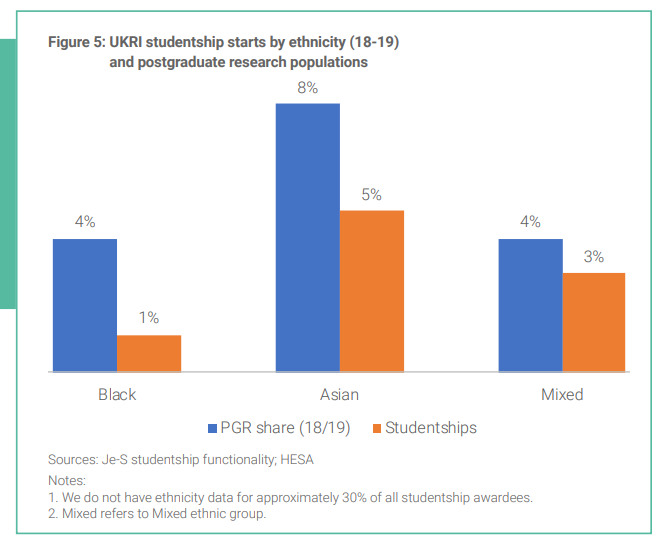Today we're back to delve into @UKRI_News' latest diversity data on PhD studentships. Share your thoughts and comments in our thread. 1/n https://twitter.com/tigerinstemm/status/1347527475979554816
Ethnic minorities make up 7-9% of UKRI-funded PhD students over 5 years (2014-19), an underrepresentation compared to the UK population. Disaggregation reveals further differences within this group. 2/n
Most ethnic minority students are of Asian ethnicity (5% of total studentships) - in particular Chinese and Indian students - followed by mixed ethnicity (3%), then Black ethnicity (1%). 3/n
Within the Black ethnic group, African students are much more represented (75%) than Caribbean and other groups. Only 10 Caribbean students were reported per year from 2015-2019. This disparity mimics the situation at senior levels. 4/n https://twitter.com/tigerinstemm/status/1347527485647421440?s=20
This data was previously reported by @LeadingRoutes in 2019, but the UKRI report shows that the very small number of Black Caribbean PhD students has not changed in 4 years. 5/n https://twitter.com/LeadingRoutes/status/1173871098007609349
One consistent feature between ethnic groups is that they all represent smaller proportions at studentship levels than at total PGR level. 6/n
This likely reflects lack of UKRI funding for overseas students but also suggests that ethnic minority home students may be missing out more than the total PGR numbers suggest. We need data on overseas/home studentships to assess this. 7/n
One key issue is the lack of data on ~30% of studentships, including ~20% of individuals who have ‘not disclosed’ their ethnicity. This could skew the results leading to inaccurate conclusions. How could institutions and UKRI improve this data collection? 8/n
The crucial question - why do we see underrepresentation of ethnic minorities, particularly with Black students? UKRI don’t draw any conclusions from the data but others have started to look into this @LeadingRoutes https://leadingroutes.org/the-broken-pipeline 9/n
UKRI must address their role. How do their funding priorities, student support policies (e.g. stipends, allowances) and eligibility requirements affect Black, Asian and other ethnic minority applicants/awardees? As a major funder they can influence change across institutions 10/n
And going forward? UKRI has a funding call to improve access for BAME students at PGR level and has opened studentships to overseas applicants. They must collect & analyse data to see if this results in meaningful change. What other actions are needed? Share your thoughts 11/n
11/n
 11/n
11/n

 Read on Twitter
Read on Twitter


